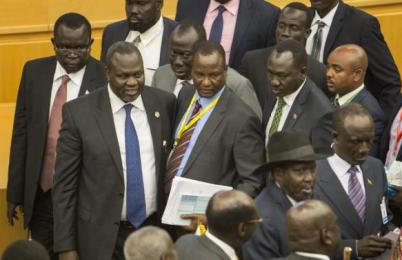SPLM-IO denies renegotiation of peace agreement, government formation delayed
January 14, 2016 (ADDIS ABABA) – The leadership of the armed opposition faction of the Sudan People’s Liberation Movement (SPLM-IO), has dismissed as “untrue” government’s recent assertions that the parties to the August 2015 peace agreement have agreed to reopen up the peace deal for renegotiations in order to resolve a number of unimplemented outstanding issues.

Although Lueth did not enumerate the 10 outstanding issues, one of them he said is the 28 states which the government unilaterally created on 2 October, adding that they would be considered either for confirmation or revocation as a political decision.
Also, Festus Mogae, chairman of the Joint Monitoring and Evaluation Commission (JMEC), said the parties agreed to reach a “consensus” outside the box over the 28 states and to also declare names of their respective nominees to the ministerial positions by Thursday and form a transitional government by 22 January.
But officials of the SPLM-IO have dismissed claims to renegotiate the peace agreement, saying there was no agreement to renegotiate the deal. The outstanding issues including the states, they said, will be implemented first in accordance with the peace agreement on the basis of the current 10 states before a transitional government of national unity can be formed.
“This is untrue. There will be no renegotiation. The agreement has provided for the current 10 states. And there are clear mechanisms in the peace agreement through which the parties will tackle creation of more states. These include whether the country’s governance system shall be based on federalism,” Machar’s spokesman, James Gatdet Dak, told Sudan Tribune when contacted on Thursday.
He said it will be through collective constitutional amendment or permanent constitution making process that the number of the current 10 states can be altered, but not to renegotiate the current provisions in the peace deal.
The SPLM-IO, he said, does not recognize the unilaterally created 28 states, which he said, is a clear attempt to violate the peace agreement.
He added that the parties in the constitution making process will agree on the number of future states in the country and the system of governance.
The opposition leader’s spokesman also said the parties have been discussing how to tackle positions of presidential advisers which the peace agreement is silent about and have no provision in the peace agreement.
GOVERNMENT FORMATION DELAYS
Dak also said a transitional government of national unity will not be formed until the outstanding issues including the constitutional amendments are resolved and the new transitional constitution is passed by a reconstituted or expanded national parliament in Juba.
He also reiterated that the leader of the SPLM-IO, Riek Machar, will not return to Juba to form the government with president Kiir until security arrangements are implemented. These include withdrawal of government forces from the national capital, Juba, and deployment of joint police and military forces in the capital.
“On what basis can the government be formed if the transitional constitution being amended is not passed by parliament? Also implementing the security arrangements is a prerequisite in the peace agreement?” he said.
He said the SPLM-IO leadership ruled out any possibility to form the transitional government by 22 January, saying the dateline was too soon given the delays in the constitutional amendment and implementation of the security arrangements which may take a number of weeks.
“I don’t think a transitional government will be formed by January 22. Given the current delays in the constitutional amendment and implementation of the security arrangements, it may take several more weeks before the government can be formed,” he added.
He blamed the government for the delays, including resisting incorporating some provisions of the agreement into the constitution, adding that the government may be formed during the month of February.
Dak said the leadership of the SPLM-IO is committed to speedy implementation of the peace deal, but said this should however be done in a “correct manner” in accordance with the agreement.
In accordance with the security arrangements in the peace agreement, the two rival national armies of government and SPLA-IO would deploy only a total of about 8,000 police and military forces in Juba. While the government is supposed to deploy about 5,000 police and military forces, the SPLA-IO will deploy about 3,000 in the capital.
However, government’s military sources revealed different opinions within its leadership as some top political and military officials including the chief of general staff, Paul Malong Awan, resist implementation of the security arrangements.
Additional police forces of 800, with 400 from each side in a state capital, will also be deployed in the states capitals of Bor, Bentiu, Malakal and other capitals and major towns which the parties are yet to agree upon.
The opposition leader’s spokesman also explained that the parties have not yet agreed on many locations of cantonment areas in which rival forces will be assembled across the country.
There will be two national armies of government’s SPLA and opposition’s SPLA-IO in South Sudan for a period of at least 18 months into the 30 months of transition before their unification into one national army.
Elections will be conducted at the end of the transitional period in which to elect a president and other executive and legislative officials.
The 21 months old war erupted on 15 December 2013 when internal differences within the ruling SPLM party over reforms and future of the party turned violent, killing tens of thousands, starting with massacres of members of the Nuer ethnic group in Juba in the first few days of the war.
Over 2.5 million people have been displaced internally and to the neighbouring countries of Sudan, Ethiopia, Uganda and Kenya.
The parties signed the agreement in August last year, brokered by the East African regional bloc, IGAD, to end the war, but its implementation has proven to be difficult.
(ST)
